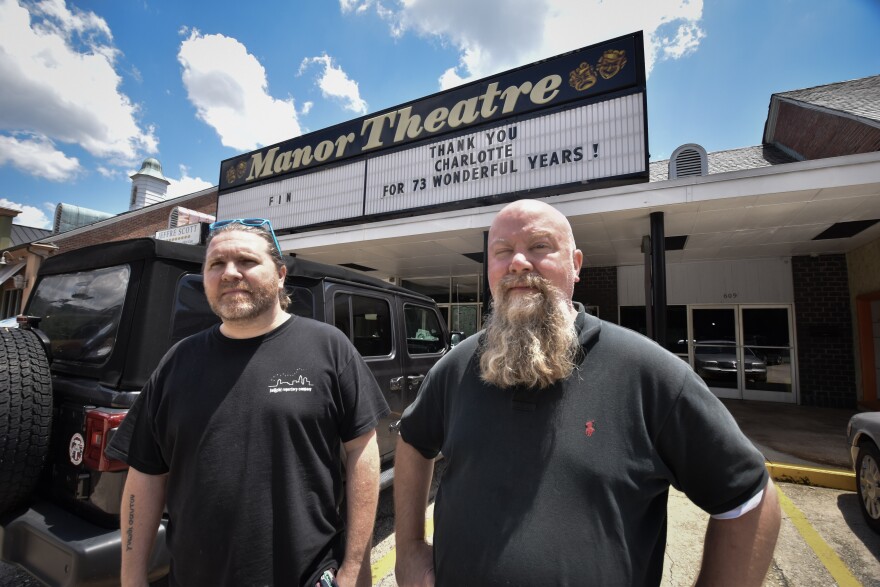The coronavirus has been devastating to the movie theater industry, especially for art house and independent theaters. Extended shutdowns and uncertainty over reopening have cut deep in revenues, and small theaters are looking for new ways to survive, while others go dark.
Inside the Manor Theatre in Charlotte on July 3, the lobby was dark, save for the dusty light filtering in from the front windows. Brad Ritter, who used to run the theater, leaned against a counter that used to be filled with candy and popcorn.
"Pretty much everything's been cleaned out at this point," he said. "All the concessions, the soda fountains -- everything's been gutted. All the closets have been -- everything's been removed from them."
He shared the building's history while walking up the stairs to the projection room. For the last 70 years, movies have played from there, but now it's empty. Downstairs, the auditoriums were completely gutted. The seats have been hauled off, the curtains pulled down and the screens removed.
"We're back to basically the original shell of the building, which dates back to 1947," Ritter said.

The theater had survived the recessions of the 1980s and '90s, even the financial crisis of the late 2000s, but not the coronavirus pandemic. This leaves Charlotte movie lovers without a place dedicated to independent and foreign films.
Jay Morang of the Charlotte Film Society says the loss will be felt across the city.
"I think about all of the people who came here, who saw movies here, who had their first dates here, who were inspired by a film that they could only see at the Manor here," he said. "And so, to me, there's an element where it makes me sad to look and go, 'Nobody's going to sit in here and get that anymore.'"
Independent theater owners across the state also watched the closing of the Manor Theatre with sadness. They're hanging on for now, though extended shutdowns are cutting deep into their revenue.
MaryBeth Poplyk is the only full-time staff member at the historic Sunrise Theater in Southern Pines. It's a nonprofit that relies almost entirely on ticket sales.
"It's been tough," Poplyk said. "Our goal is always just to break even and to provide the community with great entertainment, so we're not in money-making mode even on the best of days."
She had to lay off staff and cancel summer events, but like many other small-theater operators, she's also finding creative ways to pull in alternate sources of revenue. The Sunrise now offers popcorn and other concessions for curbside pickup. Poplyk has also joined other theaters in offering virtual screenings: You buy a ticket for a movie online, and the studio and local theater both get a cut. Poplyk says sales have been modest, though it's not the same.

"Virtual theater has been steady but nowhere near what we would get if came into our theater," she said.
Independent theaters around the country are also finding new ways to stay afloat. Alison Kozberg ran the Art House Convergence, a group for independent theaters until she lost her job due to the pandemic. When she had her job, theaters shared ideas with her over virtual meetings.
"The Trylon in Minneapolis was having a poster sale, so sometimes it's selling items," she said. "Some of it is virtual engagement. The Coolidge in Brookline, Massachusetts, has a really robust, wonderful online education film series, so educational film seminars that people can join in. In Boston, there was also film trivia to support local cinemas."
Some theaters have also staged drive-ins. Others have applied for Paycheck Protection Program loans and other emergency grants.
Most independent theaters in North Carolina say they're committed to reopening once it's safe to do so. That includes the Carolina Theatre in Durham and Cameo Art House in Fayetteville.
In Winston-Salem, Lawren Desai of Aperture Cinema is asking herself the big question: When can she reopen and how?
"I've spent so many hours thinking about what reopening would look like," she said.
Her two largest auditoriums seat 80 people each, and she says it might not be worth it to reopen if social distancing means audiences will be limited.
"When you're talking about an 80-seat theater and six feet between people, you maybe can get between 17 and 20 seats in a theater for a screening, so the economics of how that works present a real challenge," she said.
Desai is hoping the pandemic can be brought under control quickly because her theater has already lost more than a quarter of its annual revenue.
Independent theaters can survive the coronavirus pandemic, but what they do in the next few months to stretch their resources until people feel safe to see a movie in the theater will be crucial to their survival.
Click here for the latest coronavirus news on WFAE’s live blog.
Sign up here for The Frequency, WFAE’s daily email newsletter.
What questions do you have about the coronavirus? What has this experience been like for you? Share your questions below.
_




